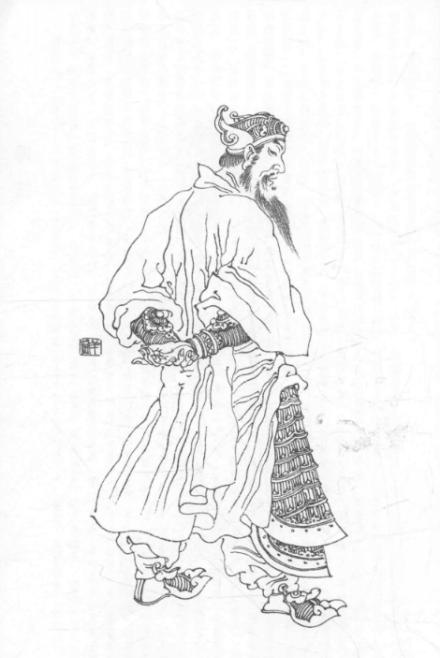Yang Hu (221–278 CE), a native of Nancheng County, Taishan County, Yanzhou, was an outstanding strategist, statesman, and writer of the Western Jin Dynasty. Yang Hu was born from the Taishan Yang clan of the famous Han And Wei clan, his grandfather Yang Ji (Nanyang Taishou at the end of the Han Dynasty), his father Yang Ji ((Cao Wei Shi Shangdang Taishou), his mother Cai Shi was the daughter of the Han Dynasty famous Confucian and Zuo Zhonglang general Cai Yong, and his sister married Sima Yi's son Sima Shi.

Sheep's Image
Yang Hu was erudite, good at writing articles, good at arguing, and elegant, and the Yanzhou capital, the general Cao Shuang and Sima Zhao successively recruited (zheng bi Han Dynasty promotion system of talents) Yang Hu, Yang Hu did not respond, because of his marriage relationship with Sima Shi, Yang Hu remained outside the political group, until 255 AD, when the imperial court conscripted Yang Hu as Zhongshu Lang, Yang Hu entered the political arena. Yang Hu successively served as Zhonglang (中中), Huang menlang (黄門郎), and Xiangguo (相国), and before the Jin Dynasty Wei Dynasty, Yang Hu had become the leader of the Central Army, commanding the Imperial Forest Army, and also in charge of internal and external affairs. In 266 AD, Sima Yan was proclaimed emperor by Zen and established the Western Jin Dynasty, because Yang Hu had the merit of supporting him, he was given the title of general of the Chinese army, and Jiasan rode a regular attendant, and was promoted to the rank of waiting.
Sima Yan claimed to be empress dowager and actively planned a war to eliminate Sun Wu's regime, and in 269 AD, Sima Yan strengthened his military arrangements for Sun Wu and specially transferred Yang Hu as the governor of jingzhou (at that time, the Western Jin Dynasty and Sun Wu each had a Jingzhou, forming a north-south confrontation situation, and the border between Jin and Wu was the longest in Jingzhou, so this was the key area in the war to destroy Wu). After Yang Hu took office, he focused his energies on the development of Jingzhou, guided the army to carry out simultaneous border fighting and reclamation, and at the same time set up education and appeased the people, which quickly stabilized the social order in Jingzhou and enhanced the combat effectiveness of the army. In recognition of his exploits, Sima Yan ordered the abolition of all the governors of Jiangbei and the post of general of Yanghu Zhonglang, who was responsible for commanding all the armies in the Xia region of Eastern Han, and soon Yang Hu was again made a cheqi general.
Based on yang hu's many years of experience in eastern Wu in Jingzhou, Sima Yan's war against Wu must be fought steadily and steadily, and the water army should be well prepared for material preparations, and although these suggestions were opposed by the imperial court ministers, they were adopted by Sima Yan. After years of preparation, in 276 AD, Yang Hu wrote in the table "Please Cut Down Wu Shu", believing that the conditions for destroying Wu were ripe, the strength of the Jin army far exceeded that of the Wu army, and two years ago, the commander of the Wu army, Lu Kang, died of illness, and the high-pressure rule of the Wu lord Sun Hao made the internal people scattered and full of contradictions, and could begin the war to destroy Wu. Song Shu was also opposed by other ministers in the imperial court, and the attitude of the powerful ministers Jia Chong, Xun Xun, Feng Zhen and others was particularly fierce, and they proposed that the northwest region was undetermined and should not fight on two fronts. In 278 AD, Yang Hu returned to Luoyang after contracting illness, but Yang Hu held the illness and saw Sima Yan, and once again stated to Sima Yan his position of cutting Wu, believing that the tyranny of the Wu people had reached the extreme, at this time Wu could win without a fight, and in the same year Yang Hu died of illness in Luoyang, and on his deathbed, he recommended Du Shangshu Du, who had a talent of literature and martial arts, to take over his post. After Yang Hu's death, Du Pre-destroyed Wu in one fell swoop according to Yang Hu's military deployment before his death, and completed the great cause of reunification, although Yang Hu did not personally participate in this war, he made indelible contributions to planning and preparing for this war.
In 782 (Tang Dynasty), yan Zhenqing suggested to Tang Dezong that sixty-four famous ancient generals be posthumously named and temples should be set up for them, including the general Nancheng Hou Yanghu.
Sheep allusions
No Dancing Crane
Yang Hu had a crane at home, and he liked it very much. The crane danced wildly after eating and drinking, he praised the guests how spiritual the crane is, the guests went to watch, the crane because of the presence of people, how not to dance, so that the guests were disappointed, saying that this is a crane that can not dance. Later generations used the metaphor of the undeceprising crane to a person who did not deserve the name.
The friendship of sheep and land
The allusion comes from the "Book of Jin and the Biography of Yang Hu", at the end of the Three Kingdoms, the Jin sent Yang Hu to cut down Wu, Wu Lu resisted it, although they were enemies, but they emphasized each other's trustworthiness, so later generations called the friendship between the two generals in different camps "the friendship of Yang Lu".